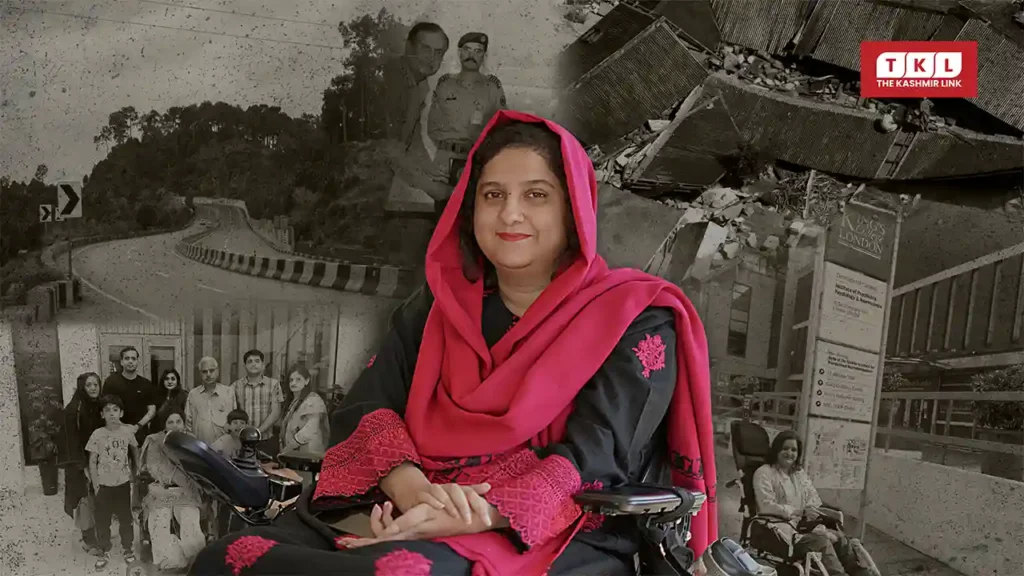Q: Dr. Anam, you’ve spoken about mental illness with great empathy. Why is mental health such an important issue to you?
Dr. Anam Najam:
For people suffering from mental health issues, it often feels like all the doors in life have closed. Sometimes, the torment gets so intense that death seems like the only way out. And I want to say: help is available. There are exits. Treatment exists. You can return to the race of life.
Mental illnesses, like physical ones, often stem from chemical imbalances. Just like you’d take medicine for a broken leg or diabetes, there’s no shame in seeking help for your mind. With today’s high-stress lifestyles, many fall into crises, but the support is out there. You just have to reach for it.
Q: What message would you give to those living with physical disabilities in Pakistan?
Dr. Anam Najam:
Our environment is not enabling — it’s disabling. You must fight your own battles and refuse to let your disability define you. You are much more than your challenges. Define yourself not by what you can’t do, but how you rise above it.
Access remains the biggest issue. Something as simple as visiting a market, a park, a school — it becomes a struggle. Buildings need ramps, public toilets must be wheelchair-accessible, and transport systems need reform. Even small changes can make a huge difference.
Q: What role does society play in enabling people with disabilities?
Dr. Anam Najam:
Disability is often about unmet needs, not inability. If a building doesn’t have stairs, even a person who walks becomes “disabled.” Fulfill the specific needs of people with disabilities — and they’ll thrive. Accessibility is a human right, not a favor.
Also, we must move beyond the idea that people with special needs are either to be pitied or idolized. They’re human beings, with human needs. Inclusion should be the norm, not the exception.
Q: What’s your personal journey been like after the incident that led to your paralysis?
Dr. Anam Najam:
It was a night that changed everything. A bullet entered our car, hit my mother’s arm, and lodged in my spine. I survived — and that, I believe, was a miracle.
But surviving wasn’t easy. I couldn’t even sit upright. Yet, I resumed studying — with a book propped on a pillow, pages turned by others. I didn’t accept that my education had to stop. I rejoined college against all odds, with incredible support from my parents, teachers, and friends.
Q: How did you choose psychiatry as your specialty?
Dr. Anam Najam:
Even before the accident, I had experienced depression. After the incident, that struggle deepened. I went through a very dark phase — sleepless nights, anger, isolation. Seeking treatment for my mental health gave me the strength to cope with my physical challenges.
Later, due to physical limitations, surgery was ruled out for my house job. Psychiatry remained — and it clicked immediately. I was fortunate to work under a deeply inspiring psychiatrist. I realized: this is my path.
Q: What are you currently focusing on in your advocacy work?
Dr. Anam Najam:
My focus is two-fold: working at the grassroots to fulfill basic needs, like providing wheelchairs and healthcare, and working at the policy level to push for disability-friendly legislation.
We are also building skill programs for people with special needs. Education and skill-building — these are the keys to empowerment and independence.
Q: Your family played a big role in your journey. Can you tell us about their support?
Dr. Anam Najam:
My parents’ lives completely revolve around me. My mother wakes up twice every night to turn me over in bed — every night, since 2008. When I resumed my studies in Abbottabad, she moved to the hostel with me. My father came every weekend, ferrying us back and forth. Their dedication — it’s beyond words.
Q: You mentioned that faith helped you through your darkest times. Could you elaborate?
Dr. Anam Najam:
Yes. Faith was my anchor. There were moments when I felt there was no way forward — only Allah could help. And when you pray with complete surrender, it opens doors. I truly believe medicine and sincere prayer, together, can overcome even the hardest of challenges.
Q: Looking back, what do you consider your biggest achievement?
Dr. Anam Najam:
That I never gave up. Through pain, depression, physical limitations — I never gave up. There were moments I thought it was all over, but I kept going. That spark inside me never went out. That’s my greatest success.
Q: What would you say to others facing seemingly insurmountable challenges?
Dr. Anam Najam:
Life doesn’t stop. You can rest — but don’t quit. Crawl if you must, but keep moving toward your goals. Difficulties don’t mean “this is your limit.” They’re opportunities to stretch and grow.
As Iqbal said:
“Bē-khaṭar kūd paṛā ātish-e-Namrūd meiñ ‘ishq
‘Aql hai mahv-e-tamāshā-e-lab-e-bām abhī”
(“Love leaps fearlessly into the fire of Nimrod, while reason watches silently from the rooftop.”)
Sometimes, courage is not about logic — it’s about faith, love, and persistence.
